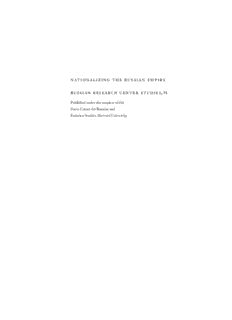
Nationalizing the Russian Empire: The Campaign against Enemy Aliens during World War I PDF
Preview Nationalizing the Russian Empire: The Campaign against Enemy Aliens during World War I
nationalizing the russian empire russian research center studies, 94 Publishedundertheauspicesofthe DavisCenterforRussianand EurasianStudies,HarvardUniversity Nationalizing the Russian Empire The Campaign against Enemy Aliens during World War I ERIC LOHR harvard university press Cambridge,Massachusetts, andLondon,England 2003 Copyright©2003bythePresidentandFellowsofHarvardCollege Allrightsreserved PrintedintheUnitedStatesofAmerica LibraryofCongressCataloguing-in-PublicationData Lohr,Eric. NationalizingtheRussianEmpire : thecampaignagainstenemyaliens duringWorldWarI / EricLohr. p. cm. — (RussianResearchCenterstudies ; 94) Includesbibliographicalreferencesandindex. ISBN0-674-01041-8(alk.paper) 1.Russian—Ethnicrelations—History—20thcentury. 2.Minorities— Crimesagainst—Russia—History—20thcentury. 3.Politicalpersecution— Russia—History—20thcentury. 4.Forcedmigration—Russia—History— 20thcentury. 5.Minorities—Governmentpolicy—Russia—History— 20thcentury. 6.Minorities—Relocation—Russia—History—20thcentury. 7.WorldWar,1914–1918—Russia. I.Title. II.Series. DK34.R9L64 2003 940.3(cid:1)086(cid:1)91—dc21 2002191913 Contents Acknowledgments ix Introduction 1 1 NationalistChallenges,ImperialDilemmas 10 2 TheMoscowRiots 31 3 NationalizingtheCommercialand IndustrialEconomy 55 4 NationalizingtheLand 84 5 ForcedMigration 121 Conclusion 166 Appendix:WartimeLeaders 175 Notes 177 ArchivalSources 229 Index 235 viii Contents Figures 1. MeetingoftheStateDumaon26July1914insupportofthe war 11 2and3. DemonstrationsinPetrogradontheoutbreakofWorldWarI 12 4. LeadersoftheRussianArmy 13 5. AftertheMoscowriot,thedestructionatthefirmGergardi Gei 44 6. EmptyvodkabarrelsfromthewarehouseofGergardiGei 45 7. AnotherviewofbrokenmachineryandrubbleatGergardiGei 46 8. Map.Areassubjecttolandexpropriationdecreesaffecting individualsofGermanorAustro-Hungarianancestrywho acquiredRussiansubjecthoodafterJanuary1,1880 101 9. Map.Majorinternmentsitesofenemy-subjectcivilians 128 10. Map.ThemassexpulsionsofJewsandthePaleofJewish settlementuntilitsabolitiononAugust4,1915 141 Tables 1. NetimmigrationfromselectedcountriestotheRussian Empire,1828–1915(inthousands) 5 2. ImplementationofthelawofFebruary8,1917,byindustrial sector 72 3. Enemysubjectsdeportedbytrainduringthewar,accordingto theMilitaryRailroadTransitDivision 127 4. GermancolonistsdeportedfromVolyniaprovinceuptoJune 22,1916 135 5. MajorareasofGermancolonistsettlement 136 Acknowledgments My research was supported in part by a grant from the International Research and Exchanges Board (IREX), with funds provided by the National Endowment for the Humanities and the United States De- partment of State, which administers the Russian, Eurasian, and East European Research Program (Title VIII). I am grateful to the Davis CenterforRussianandEurasianStudiesforsummerresearchgrantsin theearlyandlatestagesoftheproject,foracrucialsemester-longpost- doctoral fellowship, and for providing an ideal intellectual environ- ment. I would also like to thank Mark von Hagen and the Harriman Institute for Russian Studies at Columbia for hosting me while I was writing. Roman Szporluk has been generous with his time, advice, and sup- portandhasbeenanintellectualmentorintheverybestsense.Richard PipesorganizedanexcellentseminaronRussiain1916,inwhichIdis- coveredthistopic.TimothyColtonandEdwardKeenanhaveprovided much useful advice and support. Thanks also to David McDonald for inspiring me to enter the field of Russian history in the first place and forhishelpalongtheway. Many friends and colleagues have read and commented on parts of the manuscript at various stages. I am particularly grateful to Richard Benert, David Brandenberger, Robert Geraci, Mark von Hagen, John LeDonne, Dominic Lieven, Terry Martin, Randall Poole, and Josh x Acknowledgments Sanborn for reading versions of the manuscript and making many in- sightfulcomments.GrantMainlandandKellyO’Neillprovidedexcel- lent research and editorial assistance. Many thanks to Mark Baker, Patrice Dabrowski, Jonathan Daly, Benjamin Frommer, Peter Gatrell, Peter Holquist, Yanni Kotsonis, David McDonald, Kevin Murphy, ThomasOwen,JeffreyRossman,SergeSchmemann,TimothySnyder, andSergeTroubetzkoyforreadingandcommentingondraftchapters. David Brandenberger’s friendship and criticism helped every step of theway.PeterHolquisthasbeenamodelofcollegiality,engagingwith me in a voluminous correspondence on issues related to World War I andpointsofcommoninterest.ElizabethWoodandparticipantsinher informalworkshoponRussianHistoryprovidedusefulcommentsatan earlystageintheevolutionoftheproject,andworkshopsandseminars at the Davis Center were very helpful toward the end. Peter Gatrell generouslysharedhismanuscriptpriortopublication.ThankstoMark Baker, Alex Dillon, Scott Kenworthy, and Tom Trice for sharing and helping with documents. Thanks also to Kathleen McDermott, Kathleen Drummy, and Anita Safran at Harvard University Press for skillfullyguidingmethroughthepublicationprocess. A partial version of Chapter 5 was published under the title “The RussianArmyandtheJews:MassDeportation,Hostages,andViolence duringWorldWarI”inTheRussianReview60(July2001):404–419.I ampleasedtoacknowledgethejournalpublishers’courtesy. My Russian colleagues provided much advice and help in formulat- ing and conducting research for this project. Viktor Mal’kov of the RussianAcademyofSciences,InstituteofGeneralHistory,wasanex- cellent adviser and academic host in Russia. I would like to warmly thank him and all the members of the Association of Historians of World War I at the Academy of Sciences for their comments on my work.IespeciallywishtothankEvgeniiSergeevforhisextensivehelp in both intellectual and practical matters of research. Aleksandr Kavtaradze, Igor Karpeev, Iurii Kir’ianov, and Sergei Nelipovich shared their knowledge of crucial archival holdings. Staff members at theRussianarchivesandlibrarieswereconsistentlyhelpfulandprofes- sional.Inparticular,IwouldliketothankSerafimaIgor’evnaVarekova and everyone at the Russian State Historical Archive (RGIA), Tatiana Iur’evnaBurmistrovaandtheentirestaffattheRussianStateMilitary- Historical Archive (RGVIA), and Nina Ivanovna Abdulaeva at the Acknowledgments xi State Archive of the Russian Federation (GARF). Special thanks to SergeiandVioletaErshov,IrinaKuptsova,andAndreiMaliutinforall theirhelp. I especially thank my wife Anya Schmemann for her constant sup- port and for her patience while I worked in Russia and commuted be- tween Cambridge and New York. Alexei arrived in time to provide many happy diversions. Most of all, the generosity and support of my parents—RichardandJoyceLohr—madeitallpossible. Nationalizing the Russian Empire Introduction a little-known but central aspect of Russia’s participation in the FirstWorldWarwasasweepingcampaigndirectedagainstcertainmi- norities suddenly recast by the regime and society as dangerous inter- nal enemies. This campaign initially targeted enemy aliens, defined by international law as citizens of enemy states in time of war. This relatively narrow but economically and socially prominent category wassubjectedtowartimedeportation,internment,andexpropriation.1 Russiawasbynomeanstheonlycountrytotakemeasuresagainsten- emy citizens,2 but its campaign quickly swept up many others as well, fromtheempire’slargepopulationofethnicGermanstoRussian-sub- ject Jews, Muslims, and others. The campaign resulted in the forced migration of roughly a million civilians, the nationalization of a sub- stantial portion of the imperial economy, and the transfer of extensive land holdings and rural properties from the targeted minorities to fa- voredgroups. Prior to World War I, few governments formally took measures against enemy subjects residing on their territory in times of war, and leading experts agreed that no rule of international law was more strongly held than the one protecting the person and property of for- eigncitizensinwartime.3Butnearlyallcountrieseventuallyinternedat leastsomeoftheenemysubjectswithintheirterritory,andimposedex- tensivetemporaryrestrictionsontheirpropertyandeconomicactivity. 1
Description: